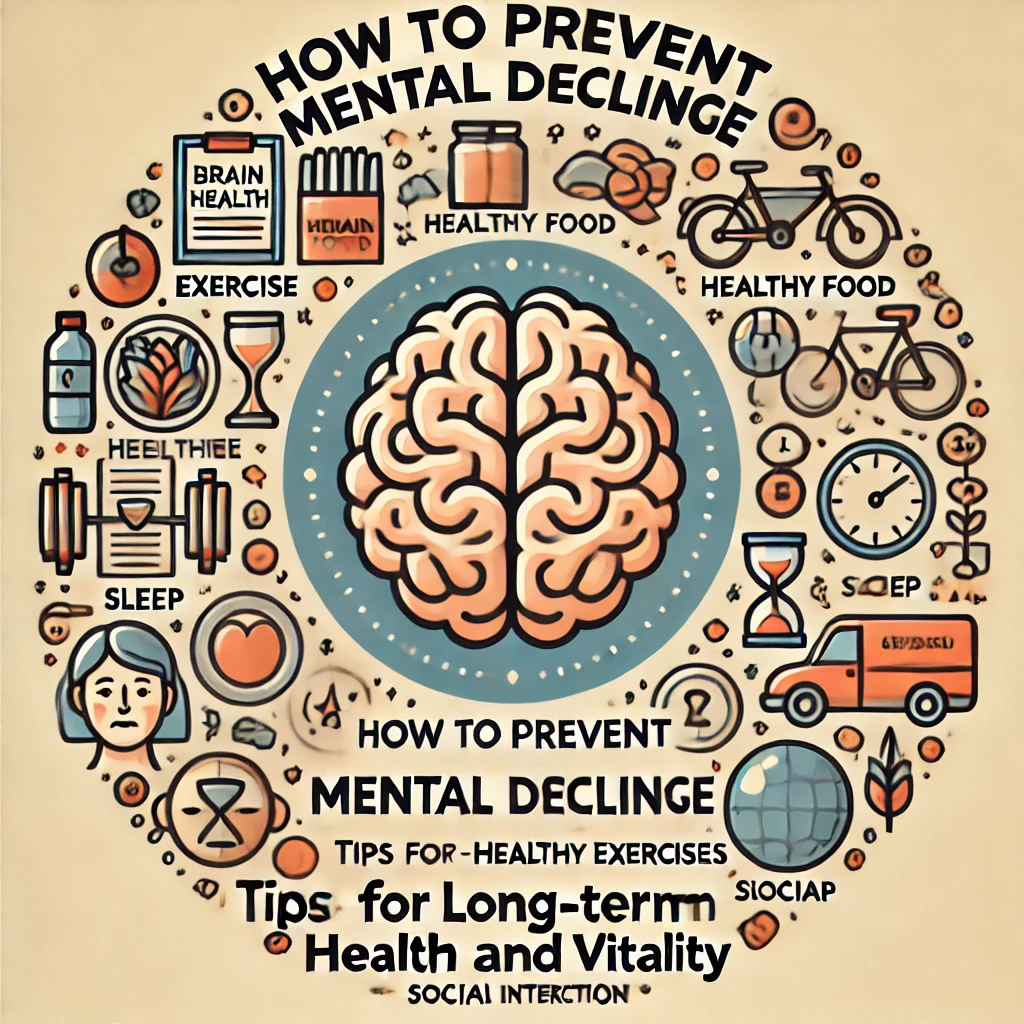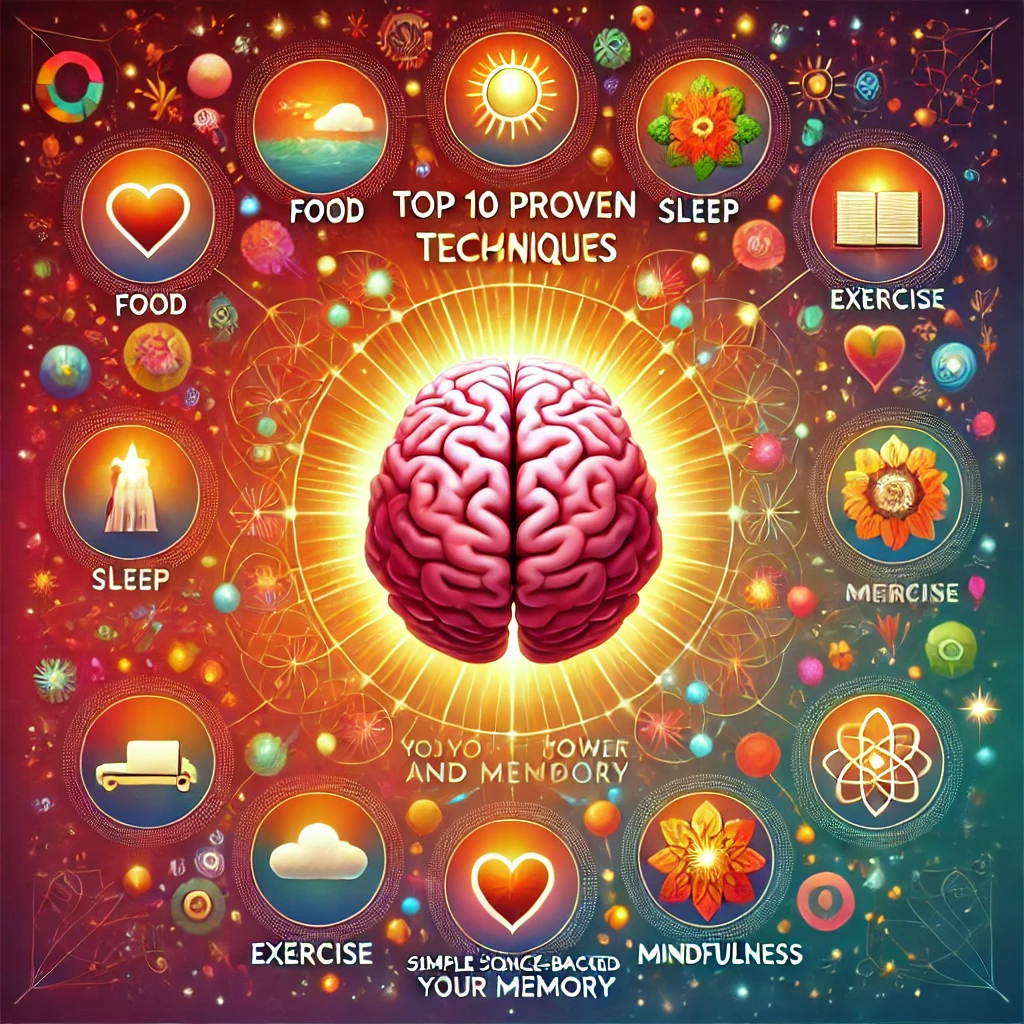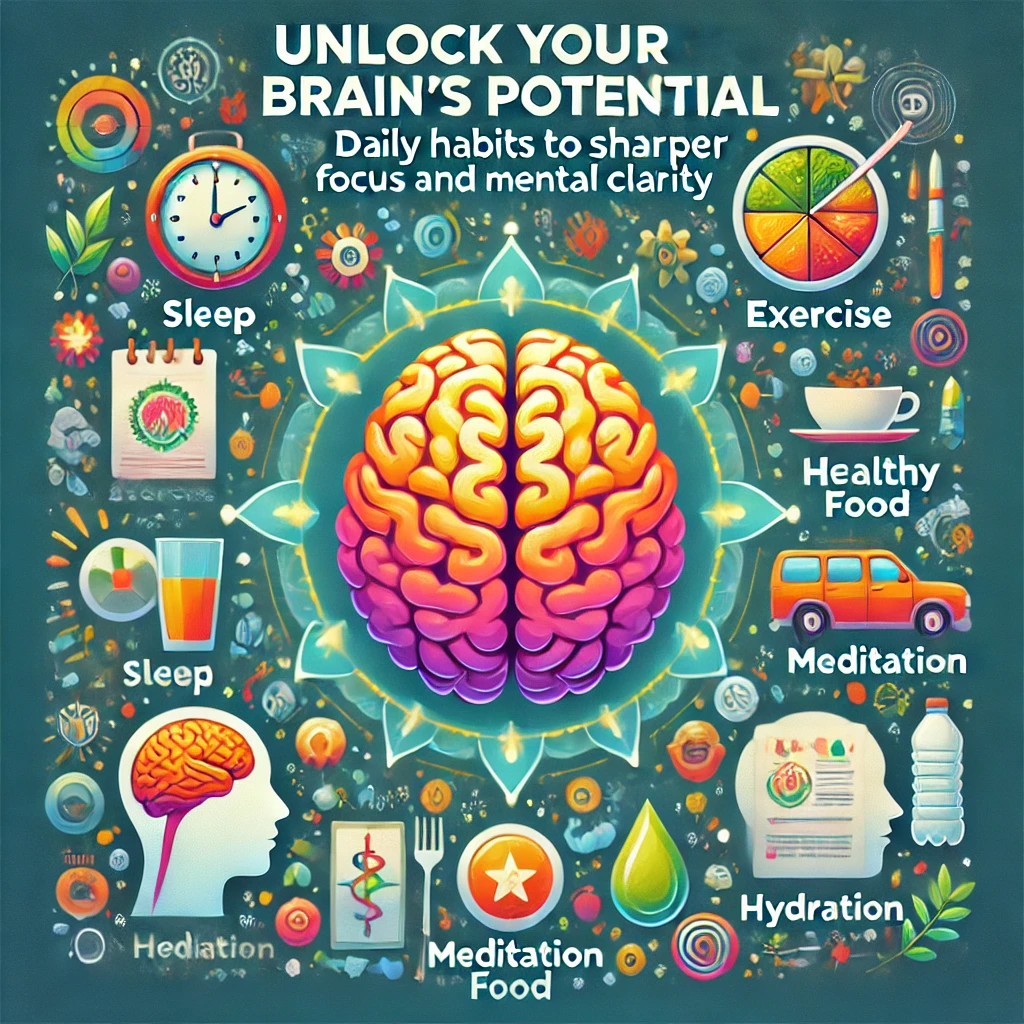Introduction
As we grow older, maintaining mental clarity and vitality becomes increasingly important. Just as we take steps to keep our bodies healthy, we can also nurture our brains for long-term cognitive function and resilience. The good news is that simple, consistent habits can help prevent mental decline, protect brain health, and improve memory over time. Whether you’re in your 30s, 40s, or beyond, these strategies for a healthy aging mind can set you up for mental longevity.
In this guide, we’ll explore science-backed tips for cognitive vitality, from lifestyle habits to natural ways to prevent dementia and protect your mind as you age. Let’s dive into these practical, easy-to-implement strategies for lifelong brain health and vitality.
1. Stay Physically Active for a Healthier Brain
Regular physical exercise is one of the most effective ways to protect brain function naturally and prevent age-related cognitive decline. Exercise increases blood flow to the brain, supports neuron growth, and releases endorphins that improve mood and reduce stress.
Relatable anecdote:
I used to think exercise was only about keeping my body fit, but once I learned that physical activity also supports long-term brain health, I became even more motivated. After starting a regular routine, I noticed I could focus better and felt more mentally alert throughout the day.
How to make exercise a brain-boosting habit:
- Aim for at least 30 minutes of moderate exercise most days of the week.
- Mix cardio (like walking or cycling) with strength training and flexibility exercises.
- Don’t forget low-impact activities like yoga and stretching, which also support brain health by reducing stress and improving blood flow.
2. Feed Your Brain with a Balanced Diet
A nutrient-rich diet is essential for cognitive vitality. Certain foods contain antioxidants, healthy fats, vitamins, and minerals that are crucial for brain health and vitality.
Key nutrients for long-term brain health:
- Omega-3 Fatty Acids: Found in fatty fish like salmon and sardines, omega-3s are known to improve memory and protect brain cells from aging.
- Antioxidants: Foods like berries, nuts, and dark chocolate contain antioxidants that combat oxidative stress, a key factor in age-related cognitive decline.
- Vitamins B, C, and E: These vitamins support brain function by reducing inflammation and protecting brain cells from damage.
Example:
I used to snack on chips and sugary treats until I learned about the impact of nutrition on brain health. Now, I reach for walnuts, blueberries, or a piece of dark chocolate when I need a snack. Not only do I feel more focused, but it’s a tasty way to boost long-term brain health.
Tips for a brain-boosting diet:
- Include a variety of fruits, vegetables, lean proteins, and whole grains.
- Limit processed foods and added sugars, which can negatively affect cognitive function.
- Drink plenty of water to stay hydrated; even mild dehydration can impair concentration and memory.
3. Get Quality Sleep to Protect Brain Function Naturally
Sleep is essential for memory consolidation, cognitive function, and emotional well-being. During sleep, your brain clears out waste products and solidifies memories, making it critical for long-term brain health.
Relatable anecdote:
For years, I used to skimp on sleep, thinking I’d catch up later. But after consistently prioritizing quality sleep, I noticed a major improvement in my mood and memory. Good sleep truly is the foundation for cognitive vitality.
Tips for better sleep:
- Aim for 7-9 hours of quality sleep each night.
- Establish a calming bedtime routine, like reading or meditating.
- Avoid screens an hour before bed, as blue light can disrupt sleep patterns.
4. Challenge Your Mind with Mental Exercises
Keeping your mind active is essential for preventing cognitive decline. Mental exercises stimulate neuroplasticity, the brain’s ability to form new neural connections, which is crucial for memory and learning.
Effective mental exercises to improve memory long-term:
- Puzzles and Games: Activities like Sudoku, crosswords, and memory games can improve cognitive function and recall.
- Learning New Skills: Trying something new, such as learning a language or playing an instrument, challenges the brain and supports neuroplasticity.
- Memory Recall: Practicing memory recall exercises, like recounting your day’s events or remembering grocery lists, can help keep your memory sharp.
Example:
My grandmother swears by her daily crossword puzzles, and she’s still sharp at 80. Inspired by her, I started doing Sudoku, and I’ve noticed it keeps my mind alert and boosts my focus.
Tips for mental stimulation:
- Dedicate 10-15 minutes each day to a brain-stimulating activity.
- Use a brain-training app if you enjoy gamified mental exercises.
- Challenge yourself by learning something new every year—whether it’s a hobby, skill, or area of knowledge.
5. Cultivate Social Connections for Cognitive Vitality
Engaging with others is not only good for your mental well-being but also supports long-term brain health. Social interactions stimulate brain areas involved in emotion, memory, and language, helping to prevent age-related cognitive decline.
Relatable anecdote:
After moving to a new city, I joined a local book club to meet new people. Not only did I make friends, but I also felt mentally stimulated by the discussions, which kept my mind active and engaged.
Ways to stay socially active:
- Schedule regular calls or visits with friends and family.
- Join clubs, volunteer groups, or community classes to meet new people.
- Consider engaging in group activities, like book clubs, exercise classes, or discussion groups.
6. Manage Stress for a Healthy Aging Mind
Chronic stress can negatively impact cognitive function, leading to memory issues and even structural changes in the brain. Learning to manage stress effectively can protect brain health naturally and support cognitive resilience.
How stress management benefits brain health:
- Reducing stress can decrease cortisol levels, protecting the brain from potential damage.
- Stress management practices like meditation improve focus, memory, and emotional well-being.
- Managing stress enhances mental flexibility, helping you stay sharp and adaptable as you age.
Example:
When I began practicing mindfulness meditation, I noticed that I felt less overwhelmed and more in control of my emotions. Meditation became a powerful tool for both my mental clarity and overall happiness.
Tips for managing stress:
- Try deep breathing exercises or the 4-7-8 technique to calm the mind.
- Practice mindfulness meditation daily, even for just a few minutes.
- Spend time in nature, which has been shown to reduce stress and improve cognitive health.
7. Avoid Excessive Alcohol and Quit Smoking for Brain Health
While moderate alcohol consumption may have some health benefits, excessive drinking can impair cognitive function and increase the risk of dementia. Similarly, smoking is linked to a higher risk of cognitive decline due to its impact on blood flow to the brain.
Relatable anecdote:
I used to enjoy a glass of wine every evening, but after learning about the effects of alcohol on the brain, I cut back to once or twice a week. Not only do I feel better physically, but I’ve noticed I have more mental clarity during the day.
Tips for minimizing alcohol and avoiding smoking:
- Limit alcohol to moderate levels (one drink per day for women, two for men).
- Try alcohol-free alternatives to make cutting back easier.
- If you smoke, consider seeking support to quit; it’s one of the most effective steps for long-term brain health.
8. Take Advantage of Natural Cognitive Boosters
Certain natural supplements may help support brain health and maintain cognitive function. While supplements aren’t a substitute for a healthy lifestyle, they can complement your efforts to prevent mental decline.
Top brain health supplements:
- Omega-3 Fatty Acids: Beneficial for memory and mood support.
- Ginkgo Biloba: Known for improving blood flow to the brain and supporting mental clarity.
- Lion’s Mane Mushroom: A natural nootropic that may promote neurogenesis and improve memory.
Example:
I started taking an omega-3 supplement after learning about its benefits for brain health, and it’s made a noticeable difference in my focus and energy. Adding supplements to my daily routine felt like a small but impactful step for long-term cognitive vitality.
Consult your healthcare provider before starting new supplements, especially if you’re taking other medications.
Conclusion
Taking proactive steps to protect brain health and vitality doesn’t have to be difficult. Simple habits, like staying physically active, eating a nutrient-rich diet, managing stress, and engaging in social activities, can make a big difference in preventing mental decline and supporting long-term cognitive function.
As with any health goal, consistency is key. Start with one or two of these tips for cognitive vitality, and gradually build on them as they become part of your routine. By making these small lifestyle changes, you’re investing in a brighter, sharper future, ensuring that your brain stays healthy and resilient for years to come.
FAQ Section
1. What is the best way to prevent mental decline?
A combination of regular exercise, a nutrient-rich diet, quality sleep, and mental stimulation is one of the most effective ways to prevent mental decline.
2. Can diet really impact long-term brain health?
Yes, a balanced diet rich in antioxidants, omega-3s, and vitamins supports brain health and can protect against age-related cognitive decline.
3. How much exercise is needed to protect brain health?
Aim for at least 30 minutes of moderate exercise most days of the week. Activities like walking, cycling, and strength training are particularly beneficial.
4. Are supplements helpful for preventing cognitive decline?
Certain supplements, like omega-3 fatty acids, Ginkgo Biloba, and B vitamins, may support brain health. Consult a healthcare provider for personalized advice.
5. How does sleep impact cognitive function?
Sleep is essential for memory consolidation, toxin removal, and overall cognitive function. Aim for 7-9 hours of quality sleep each night.
6. What types of mental exercises are good for brain health?
Activities like puzzles, learning new skills, and practicing memory recall can all help improve memory and support cognitive vitality.
7. Can social interactions really improve cognitive health?
Yes, social engagement stimulates the brain, reduces stress, and helps maintain cognitive function, making it an important part of a brain-healthy lifestyle.
8. How can stress management support brain function?
Managing stress reduces cortisol levels, which protects brain cells and supports focus, memory, and mental flexibility.
9. Are there natural ways to prevent dementia?
Yes, a healthy lifestyle—including exercise, a balanced diet, mental stimulation, social engagement, and stress management—can all help lower the risk of dementia.



